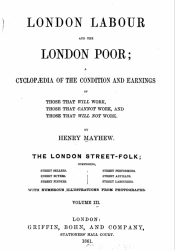Henry Mayhew and London Labour and the London Poor
Henry Mayhew was an essential part of the labor movement in London. His most famous work, London Labour and the London Poor, published in three volumes in 1851, was among the first few investigative journals to be published to the London public. Kira Braham, an English instructor at the Louisiana School for Math, Science and the Arts, explains the significance of Mayhew’s investigative work in her article “The Victorian Gig Economy: Casualization in Henry Mayhew’s Morning Chronicle Letters”. She writes that “writings omitted from London Labour reveal a serious social investigator conducting the first empirical study of poverty in London [...] [There is] evidence of a politically radical Mayhew whose strident opposition to unregulated capitalism put him at odds with respectable London, including the very paper that had commissioned his work” (60). Mayhews work detailed information that the general population did not want to think about — the life of the poor. By going into extensive detail, the public was not able to just ignore the struggles that so many went through. “Out of sight, out of mind” was no longer an option once Mayhew’s work became more popular. Most upper and upper-middle class readers of Mayhew’s writings were uncomfortable with the message that London Labour and the London Poor was trying to send about the horrendous conditions of the working class. However, this was Mayhew’s intention. Anne Humpherys, an English and Women’s Studies professor, details in her academic article "Henry Mayhew (25 November 1812-25 July 1887)" that Mayhew’s intention was to make the public aware of the poor’s working and living conditions while giving first-hand accounts of what life in London was like for these people (18). Additionally, first-hand accounts showed more authenticity in his writing and made people more sympathetic to what the poor and working-class were going through at the time.
Mayhew’s writings followed those at the very bottom of the social, economic, and political hierarchy. He details his findings of interviewing those with the least pleasant jobs imaginable, such as crossing-sweepers, mud-larks, pure-finders, refuse-collectors, chimney-sweeps, and prostitutes. In one memorable interview, Mayhew interviews coal-heavers on the hardships associated with their jobs. One man expressed to Mayhew that “a coalwhipper’s life is one of debt and struggles—it is a round of relieving, paying, and credit. We very rarely have a halfpenny[242] in the pocket when we meet our credit” and that the “great evil is the uncertainty of the work. [The coal-heavers] have all to take our rotation. This uncertainty has this effect upon many of the men—they are compelled to live on credit” (241-242). The uncertainty of when these men will work and how much they will be able to make in that time was a tremendous stress on them and their families. Mayhew writes that “the wives and children of the coalbackers are generally in great distress” from the unreliable nature of the job (242). Most of these workers are the main providers for their families, and with the uncertainty surrounding the job, there is never a guarantee that the family will have something to eat or a roof over their heads. Mayhew’s writings in the London Labour and the London Poor were revolutionary for its time because of the strides it made in investigative journalism and it was a significant event in the history of working conditions and labor rights. Mayhew's writings relate to the Great Resignation because both of them were responses to the 99% and the widening class gap. Mayhew's interviewees did not always have the luxury to quit their jobs because of unfair treatment, as many in the Great Resignation movement were doing, but they both brought awareness to their cause. Mayhew's writings brought attention to the poor working conditions in London in 1851 just as the Great Resignation has brought attention to poor working conditions in America in 2020 and 2021.
Sources:
Braham, Kira. “The Victorian Gig Economy: Casualization in Henry Mayhew’s Morning Chronicle Letters.” Nineteenth-Century Contexts, vol. 44, no. 1, Feb. 2022, pp. 57–74. EBSCOhost, https://doi-org.proxy.ulib.uits.iu.edu/10.1080/08905495.2021.2023344.
Humpherys, Anne. "Henry Mayhew (25 November 1812-25 July 1887)." Victorian Novelists After 1885, edited by Ira Bruce Nadel and William E. Fredeman, vol. 18, Gale, 1983, pp. 167-171. Dictionary of Literary Biography Vol. 18. Gale Literature: Dictionary of Literary Biography, link-gale-com.proxy.ulib.uits.iu.edu/apps/doc/FDABXN675305072/DLBC?u=iulib_iupui&sid=bookmark-DLBC&xid=a25f42cc. Accessed 29 Apr. 2022.
Mayhew, Henry. London Labour and the London Poor. III, Dover Publications, 1968, Google Books, https://books.google.com/books?id=tVtHAAAAYAAJ&printsec=frontcover#v=one..., Accessed 27 Apr. 2022.
Related Events:
The Wonderful Adventures of Mrs. Seacole in Many Lands (Conflict in Ukraine: A History): https://editions.covecollective.org/chronologies/wonderful-adventures-mr...
This book details the story of Mary Seacole, a nurse during the time of the Crimean War. Seacole told a story that many people did not want to hear; she detailed her experience with racism, hardships, and war. Seacole's book related to Mayhew's because they both told the public things that they did not necessarily want to hear, but needed to.
Literary Event: The Interesting Narrative of the Life of Olaudah Equiano (Will Smith at the Oscars: Why Stereotypes are the Root of the Problem): https://editions.covecollective.org/chronologies/literary-event-interest...
This book was written by a former slave. Equiano relates his story along the Transatlantic Slave Trade and his experience as a slave. Similarly to Seacole's narrative, Equiano's story also relates to Mayhew in the way that it educated the public on topics that they were not overly eager to understand.

